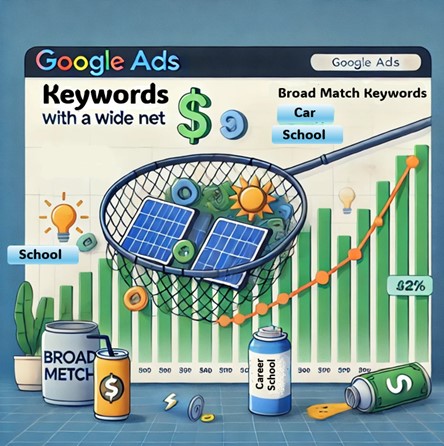Google Ads is a powerful tool for driving traffic, but using broad match keywords can lead to inefficiencies, wasted budget, and irrelevant traffic. Broad match casts a wide net, showing your ads for searches that may be loosely related to your keywords. While this can increase visibility, it comes with significant downsides.
1. Irrelevant Traffic
Broad match can trigger your ads for unrelated searches. For example, targeting “automotive school” might show your ad for “automotive driving ed school ” or other irrelevant queries, leading to wasted clicks.
2. Higher Costs Per Conversion
The wide targeting of broad match often results in higher costs per conversion because many clicks won’t lead to conversions. This lowers your return on investment (ROI) and increases your ad spend on low-quality traffic.
3. Wasted Budget
Broad match can quickly deplete your budget by targeting irrelevant search queries. Without careful monitoring, you might spend a significant portion of your ad budget without getting the right audience, limiting the effectiveness of your campaign.
4. Lower Quality Score
Google Ads uses Quality Score to rate the relevance of your ads. Broad match keywords can lower your score because they generate irrelevant impressions, ultimately increasing your costs and lowering your ad performance.
5. Diluted Focus
Broad match limits the precision of your campaigns. When your ads are triggered by a wide variety of search terms, it becomes difficult to tailor your message to specific user intent, reducing engagement and conversions.
Mitigating Risks
To make broad match work, we utilize some of the following management methods:
- Use Negative Keywords: Regularly add negative keywords to block irrelevant searches.
- Monitor Search Terms: Review your search terms report to adjust for any irrelevant queries.
- Use Smart Bidding: Pair broad match with Smart Bidding to optimize for conversions.
- Test Match Types: Run tests to compare the performance of broad match with phrase and exact match.
Conclusion
While broad match can expand your reach, it often leads to irrelevant traffic and higher costs. Weboganic best practices can include broad match along with more targeted match types like phrase or exact match. We manage our ad work to maximizing ROI and improve campaign focus.



